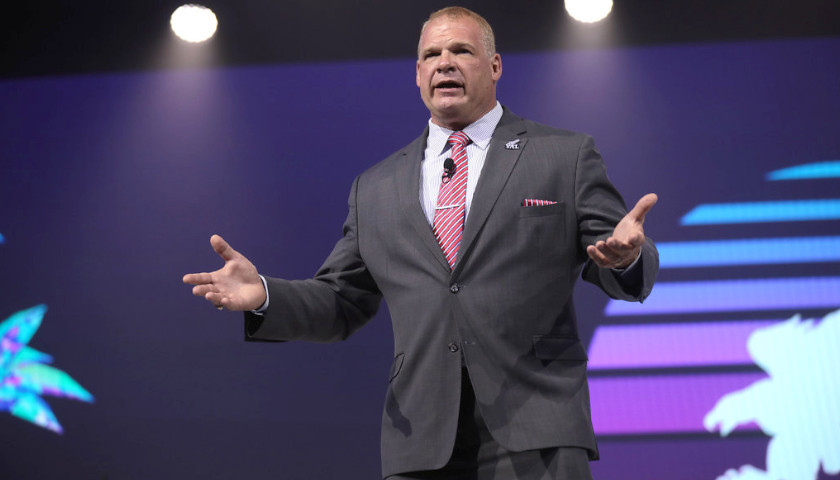Live from Music Row Tuesday morning on The Tennessee Star Report with Michael Patrick Leahy – broadcast on Nashville’s Talk Radio 98.3 and 1510 WLAC weekdays from 5:00 a.m. to 8:00 a.m. – host Leahy welcomed California refugee and direct mail pioneer Craig Huey to the studio.
At the top of the second hour, Huey described what motivated him to leave California and reset his business in Nashville, Tennessee. He later went on to explain multiple issues that made California an impossible place for a small business or an entrepreneur to succeed.
Leahy: We are broadcasting live from our studios in Nashville, Tennessee on Music Row. I love saying that Craig.
Huey: Yeah, that’s great. (Chuckles)
Leahy: Who wouldn’t want to be broadcasting live from a studio on Music Row in Nashville, Tennessee?
Huey: It sounds absolutely incredible.
Leahy: It’s a lot of fun. and I think a lot of people from California just can’t wait to come to Middle Tennessee and Nashville and move their businesses here. Tell us about your business move and all of what have you experienced. You have 25 employees. Now you had an office in California?
Huey: Oh, yeah that that from the beginning we had the office.
Leahy: Where was the office?
Huey: Torrance, California
Leahy: Torrance? That’s in LA County.
Huey: Yep in LA County. We had our whole agency there. Copywriters and artists and web developers and digital people. And the fact is we could not continue to work there. We could not continue to operate.
Leahy: Well, what were the obstacles and hurdles what put you over the top? When did that happen? When were you sitting in your office in Torrance, California, and said I got to get out of here? What put you over the top?
Huey: You know it’s not just one issue. There are multiple issues. Let me just give you some it’s going to shock people. The first one was when my son moved to Nashville and he started looking at having a couple of additional employees with him the quality of the employees was completely different than what we were finding in California.
Leahy: When you say different, do you mean better? And in what particular ways would you Tennessee employees are different than California employees?
Huey: Attitude. Friendliness. A willingness to work well. Well, it was a completely different sense of their responsibility versus the California attitude, which was just completely different.
Leahy: Give me my money and then I’m leaving it’s five o’clock.
Huey: I’m leaving at 5 o’clock and finding another job that I can double my salary.
Leahy: So it was more of what is it that you as an employer can do for me as opposed to what can I as an employee do to help you succeed? And so I’ll make more money because you succeed. Would you say that’s a fair characterization of the difference?
Huey: 100 percent. And then we have the issue that I was paying lawyers so much money because in California if I would fire somebody (Leahy chuckles) they would immediately sue me. And it doesn’t matter what the issue is.
Leahy: It doesn’t matter what the issue is.
Huey: And I would automatically have to send a lawyer $25,000 to $30,000 because they basically said it will cost you that much if we go to court. It is an anti-business legal system there that is horrendous.
Leahy: I had a business in California back in the late 80s. And I had a guy who was the sales guy and wasn’t performing. And he was 46. He was 45 and I fired him. I hired as a replacement for a guy who was 46 and I got sued for age discrimination.
Huey: Yeah. It’s ridiculous.
Leahy: It’s like again the same thing. Yeah, this was back in the late 1980s.
Huey: And it’s worse now.
Leahy: And I thought well, this is crazy. This is totally crazy. I had a guy as a preliminary part of it, a guy from the state of California came to interview me about this. He could barely the guy that interviewed me who was going to be the first level of adjudication before it went to litigation could barely speak English. And he’d only been in the country like three or four years. And I thought this is crazy! That was really what I thought. I said you can’t grow a business in a state like that.
Huey: You cannot.
Leahy: And it’s gotten worse.
Huey: It’s gotten worse. And then there was a thing called an AB5 which was a bill that was passed in California. And Michael you may have heard about the Uber bill.
Leahy: Yeah, this is destroying the gig economy, right?
Huey: Totally. So listeners can understand what happened California has banned independent contractors. Now as an ad agency, I would hire copywriters and artists and account executives because I wasn’t sure how much business I would be having coming in for different accounts. And so I’d hire them as an independent contractor. California said I could not do that. Which means I couldn’t operate as an ad agency in California.
Leahy: So that was one of the other elements that drove you out. You know, it’s interesting this independent contractor versus an employee.
Huey: Right.
Leahy: In the modern economy for a small business if you have an independent contractor agreement with somebody and they don’t have to report to work and they don’t have to do anything except that you have a contract with them to deliver X, Y, or Z. And if they deliver X, Y, and Z they get paid. And if they don’t, you know, you say thank you so very much.
Huey: That’s right.
Leahy: Good luck. We’re terminating this independent contractor agreement.
Huey: That’s right.
Leahy: If you’re an employer, however, it’s a totally different deal and there are all sorts of, you know, requirements legal requirements you have to meet. And it’s a much deeper relationship. Much more intertwined.
Huey: Yes. Yes. So California made that impossible. Then there are the taxes. Michael, as a small business I’m taxed for income whether I make profits or not. I’m taxed for the income.
Leahy: For revenue.
Huey: Revenue. Yeah, and that’s 12.5 percent, and now it’s about ready to go up to 16 percent.
Leahy: Yikes! Yikes!
Huey: And then they’re talking about a wealth tax in California…
Leahy: For the sin of accumulating wealth by working hard. (Chuckles)
Huey: Exactly. That’s a terrible thing. So those were some of the issues we were seeing. It’s impossible to stay here in California. We have to leave.
Leahy: When did that final determination come into your mind and then you decided I’m moving?
Huey: 2019 was the decision time that we had to leave. And so we started looking. We started investigating. And that’s when we found Nashville, Tennessee. And that we’d have to find a home out in this area. And so that was the start. And then when the pandemic hit it was like, okay.
Leahy: So March of 2020 you’re still in California?
Huey: Still in California.
Leahy: So it was June of 2020 that you moved here. And we’re only in November. So you’ve been here July, June, July, August, September, and October. Basically six months.
Huey: That’s right. And you know we’re pleased with it and we’re excited about it and we’re glad we did it. Now what we did is we closed down the office.
Leahy: In California.
Huey: In California. And I had to hire a lawyer to make sure I did it legally. So that unraveling was you know, quite a challenge.
Leahy: Huge.
Huey: Any business owner who moves it’s hard because you’re talking about employees and you’re talking about expenses.
Leahy: So you have employees there and I guess you gave them the option of moving to Nashville?
Huey: Exactly. So we flew them to Nashville and had them see Nashville. They had to decide. Most of them who stayed wanted to stay with their family.
Leahy: Yeah. Well, if it’s family would have been a big issue. And a lot of these employees have been with you for a long time. But some of them moved right?
Huey: Some of them moved.
Leahy: And those that have moved, how do they feel about it?
Huey: They think it’s the greatest thing. Nobody has regrets.
Leahy: I cannot disagree with that. I will tell you this, you know, so we’ve lived here since 1990. It’s the greatest state in the Union. It has no state income tax. Great people. And it has only really two crazy counties in the state. You could argue maybe more than two. But two that are really crazy. Davidson County in Nashville where the tinpot dictator, the Bill DeBlasio of the South John Cooper is a mayor with all of his illegal unconstitutional decrees.
Huey: Yes.
Leahy: And then Shelby County. Those are the two, you know, super blue counties. But the rest of the state is pretty strongly conservative.
Huey: It’s absolutely amazing coming from a state that collectivism and estate-ism is a given. And it’s not here. I’ll tell you something about what we noticed, but let me just tell you one thing first. We moved to Nashville and we’re in Germantown.
Leahy: The business?
Huey: The business. We love it there. But if I had known about Cooper in these additional taxes and the trends going on in Nashville I probably would have moved the business to somewhere in Williamson County. And I probably would have gone to Cool Springs or something like that. I’m very concerned about how Cooper is very much like the Los Angeles mayor.
Leahy: Yeah.
Huey: And it’s devastating the business. And devastating to people and it doesn’t matter what income level. What he’s doing is he’s destroying economic opportunity.
Leahy: So it would not be unfair to call him not just the Bill DeBlasio of the South, but also perhaps the Eric Garcetti of the South?
Huey: Exactly. (Leahy chuckles)
Listen to the full second hour here:
– – –
Tune in weekdays from 5:00 – 8:00 a.m. to the Tennessee Star Report with Michael Patrick Leahy on Talk Radio 98.3 FM WLAC 1510. Listen online at iHeart Radio.








